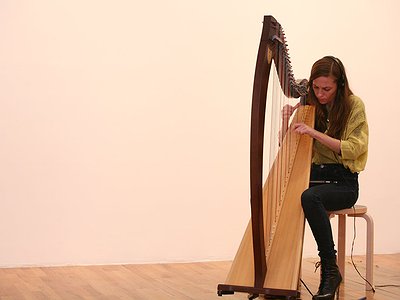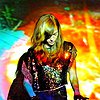How important are practising and instrumental technique for achieving your musical goals?
Practicing and instrumental technique are very important to me. I often perform endurance pieces and so it is very important to keep myself in shape by practicing every day that is possible. I use a lot of extended technique which is inherent to my personal sound as a harp player so aside from maintaining standard harp technique it is also essential I practice these extended forms, as many of them are hard on the fingers.
What do improvisation and composition mean to you and what, to you, are their respective merits?
There is a part of me that views improvisation as instantaneous composition and the only difference between the two is the form it takes once it's been expressed. With free improvisation, the form in which it exists is either as a memory of the performer or the listener or a recording. To clarify, nothing is written down with improvisation. So when it happens the only record of its existence is in the memory of the people that experienced it or in a recorded format for future listening. Whereas traditional notation can take the form of both memory, recording and visual scores to look at. On a more - dare I say psychological/spiritual spectrum - free improvisation is about being in the now. The current state of one's psyche and traditional notation documents past thoughts, feelings and ideas along with the reworking and analysis of these past thoughts, feeling and ideas. I use both. More often than not I use both simultaneously. The majority of my written work includes moments of free improvisation for the performer. Even the songs I write for my ambient electronic project Rowan, has an improvisational element simply because all are written to memory and not on a physical page. As the shows happen there are slight variations to each song over time.
How do you see the relationship between sound, space and composition?
I view these three elements as interconnected. When one takes on the task of composing they are organizing sound in a space or with space between the sounds.
The role of an artist is always subject to change. What's your view on the (e.g. political/social/creative) tasks of artists today and how do you try to meet these goals in your work?
I really can't speak for artists in general but in regards to my own work I am not one to take a political stance. However, I've been told that just being avant-garde in nature can be viewed as a social/political stance separate from the mainstream and symbolizes leftist thoughts and ideals whether they are political or social. With that said my work both in music and with my sound sculptures tends be rooted in a personal desire to communicate without words. The written word doesn't come easily to me and I find it almost painful to put my thoughts down in writing. Both music and visual art allow me to express my thoughts and emotions without having to rely on words. It also gives me a platform to connect with other humans in an intimate way and hopefully affect an individual's state of mind and in some way simultaneously entertain them.
Music-sharing sites and -blogs as well as a flood of releases in general are presenting both listeners and artists with challenging questions. What's your view on the value of music today? In what way does the abundance of music change our perception of it?
I am probably one of the few people left that does not download music. I am not one to follow blogs and I don't use music sharing sites. So my perception of music hasn't changed much. I still value music and I think in general almost everyone does. The abundance of music availability has maybe opened up people to listening to a more diverse catalogue of music, which to me is a good thing. Generally, I am introduced to new music either by the artist asking me to perform with them or by friends sharing music they either make or love with me.
Usually, it is considered that it is the job of the artist to win over an audience. But listening is also an active, rather than just a passive process. How do you see the role of the listener in the musical communication process?
Without a listener the music doesn't exist.
Please recommend two artists to our readers which you feel deserve their attention.
Mary Lattimore, Matana Roberts and Maria Chavez
To read more about Shelley and her collaborations, visit shelleyburgon.com



